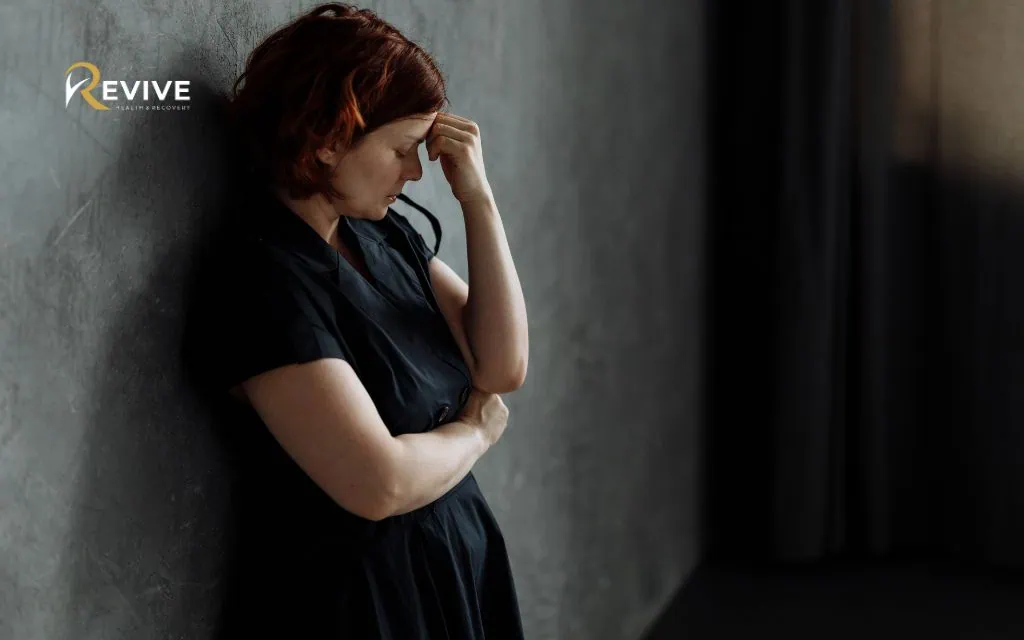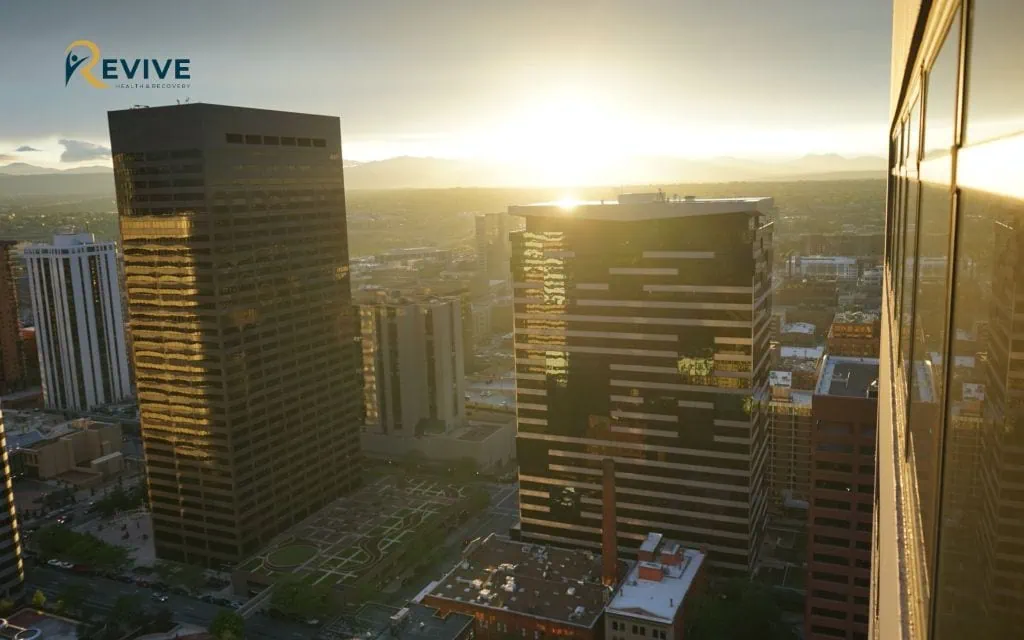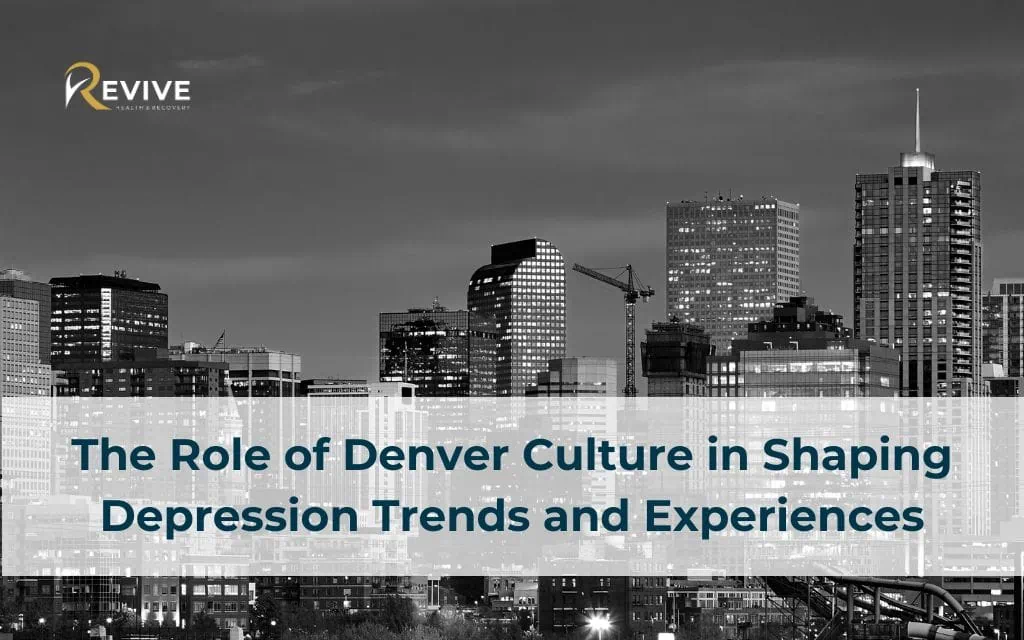Denver culture and depression present a fascinating paradox – a city celebrated for its outdoor lifestyle, sunshine, and wellness culture, yet struggling with significant mental health challenges. With one in eight residents experiencing depression and Colorado ranking 46th nationally for mental health services, understanding the relationship between Denver culture and depression is crucial.
At Revive Health Recovery, we see firsthand how Denver culture and depression interact through the Mile High City’s distinct elements – from outdoor recreation and wellness trends to social scenes and economic pressures. Our team of specialists has helped hundreds of Denver residents find balance between enjoying what makes this city special while managing depression.
The connection between Denver culture and depression affects many residents who feel overwhelmed by fitness expectations or seek deeper community connections. This exploration of Denver culture and depression offers insights and resources for finding balance in your mile-high life. If you’re struggling with how Denver culture and depression affect you, call us at (303) 268-4655 for personalized support.
The Pressure of Denver’s Active Outdoor Culture
The “14er Effect”: When Recreation Becomes Expectation
Denver culture and depression are intertwined with outdoor recreation – approximately 80% of residents participate in outdoor activities regularly. While this aspect of Denver culture offers tremendous benefits, it creates unique pressures that contribute to depression not found in other major cities.
“Many clients tell us they feel inadequate when they can’t keep up with friends climbing 14,000-foot peaks every weekend,” explains our lead therapist. “This aspect of Denver culture and depression is what we call the ’14er Effect’ – when recreation transforms into expectation.”
Research on Denver culture and depression shows about 15% of Denver residents report feelings of inadequacy related to outdoor achievement pressure, often exacerbated by social media where hiking accomplishments and mountain vistas dominate feeds.
The physiological impact of Denver’s 5,280-foot elevation compounds how Denver culture and depression interact. High altitude affects brain chemistry, potentially reducing serotonin production and oxygen levels – both critical factors in mood regulation. This biological reality means Denver culture and depression have an additional neurochemical relationship.
Seasonal Affective Disorder with a Colorado Twist
Despite Denver’s celebrated “300 days of sunshine,” the connection between Denver culture and depression includes unique seasonal mental health patterns. The contradiction creates what locals call “mountain blue” – depression that persists despite abundant sunshine.
“Clients often express guilt for feeling depressed in such a sunny place,” notes our clinical director. “This adds another layer to how Denver culture and depression interact – feeling they should be happier because of the weather.”
Winter brings additional complexities in the relationship between Denver culture and depression when temperatures limit outdoor activities. The cultural expectation to remain active year-round creates pressure during seasons when many naturally need more rest and recovery time.
Finding Balance in Denver’s Natural Spaces
Enjoying Denver’s natural beauty without contributing to depression doesn’t require scaling mountains or extreme adventures. Consider these balanced approaches to navigate Denver culture and depression:
- Explore urban parks like City Park or Washington Park, which offer natural settings without the pressure of performance
- Join inclusive outdoor programs that emphasize enjoyment over achievement
- Practice mindful nature engagement, focusing on present-moment experience rather than distance covered
At Revive Health Recovery, we help clients develop personalized strategies to benefit from Denver culture and depression treatment through nature without performance pressure. Many find that simple, regular engagement with natural spaces provides significant mental health benefits.

Wellness Culture and Mental Health Stigma
When Wellness Becomes Another Standard to Meet
The relationship between Denver culture and depression includes a wellness-focused environment that creates what locals call the “Colorado paradox” – where outward health focus can mask internal struggles. Approximately 20% of residents report negative effects from this aspect of Denver culture and depression.
The emphasis on physical perfection creates additional barriers to mental health treatment. Many people hesitate to acknowledge depression when surrounded by messaging about “optimal wellness” and “living your best life.”
“We see clients who’ve delayed seeking help because they felt they should be able to ‘fix’ their depression through exercise or diet alone,” explains our intake coordinator. “While those elements support mental health, Denver culture and depression often require specialized treatment.”
The Wellness-Mental Health Disconnect
Denver culture and depression research shows that the focus on physical wellness often overshadows mental health needs. The city boasts numerous fitness centers and health food stores but has significant gaps in mental health services.
This disconnect reinforces stigma around depression treatment. When wellness conversations center exclusively on physical health, Denver culture and depression become marginalized or misunderstood.
Integrated Wellness Approaches in Denver
At Revive Health Recovery, we bridge the gap between Denver culture and depression treatment. Our approach recognizes that true health encompasses both mind and body, offering:
- Treatment plans that incorporate appropriate physical activity as a supplement to evidence-based therapy
- Nutritional guidance that supports brain health and mood regulation
- Stress management techniques that address both physical and psychological aspects of well-being
For personalized guidance on integrating mental health into your wellness routine while navigating Denver culture and depression, contact us at (303) 268-4655.
Social and Economic Lifestyle Factors
Denver’s Social Scene: Connection and Isolation
Denver culture and depression have a complex relationship within the social landscape – particularly its renowned craft beer culture. Research indicates approximately a 5% correlation between engagement in Denver’s drinking culture and depression symptoms.
As a city of transplants, Denver culture and depression present unique social challenges. Many residents have relocated for career opportunities, leaving established support networks behind. This creates pressure to form new connections, often through activity-based relationships that may lack emotional depth.

“We work with many clients who have plenty of hiking buddies but few people they can call during a mental health crisis,” notes our community outreach coordinator who specializes in Denver culture and depression.
Housing costs further complicate how Denver culture and depression interact, pushing residents to outlying areas and creating neighborhood isolation. As communities spread out, maintaining consistent social bonds becomes more difficult.
Economic Pressure in a Booming City
Denver culture and depression are significantly impacted by the economic landscape. Rising housing costs force many residents to work longer hours or multiple jobs, reducing time for self-care and social connection.
Financial barriers also directly affect treatment access for those experiencing Denver culture and depression challenges. Approximately 65% of Denver residents cite cost concerns as a primary reason for delaying mental health care.
Industries dominant in Denver – particularly tech, healthcare, and hospitality – often feature high-stress work cultures contributing to burnout. The city’s competitive job market adds pressure to maintain demanding schedules, further complicating Denver culture and depression.
Building Authentic Community in the Urban Landscape
Finding meaningful connection while managing Denver culture and depression requires intentionality:
- Explore interest-based groups that move beyond activity partnerships to foster deeper relationships
- Consider neighborhood-based organizations working to build community within specific areas
- Investigate Denver’s diverse cultural centers, which often provide supportive communities
At Revive Health Recovery, we understand that social connection is fundamental to addressing Denver culture and depression. Our group therapy options help clients build authentic relationships while developing coping skills for depression.
Positive Cultural Outlets for Mental Health
Denver’s Thriving Arts Scene as Therapy
Denver culture and depression treatment can include powerful outlets for emotional expression and healing through the arts community. Approximately 5,000 residents actively engage with the city’s art scene as a form of mental health therapy and support.
The RedLine Contemporary Art Center’s REACH program specifically addresses the relationship between Denver culture and depression through creative expression. Their workshops offer accessible entry points to artistic practice focused on emotional processing rather than technical skill.
“Art bypasses our analytical brain and accesses emotions directly,” explains our expressive arts therapist who specializes in Denver culture and depression. “For many Denver residents dealing with depression, creative engagement offers release from pressure to verbalize their experience.”
Community Groups Making a Difference
Denver’s Five Points neighborhood, historically known as the “Harlem of the West,” hosts community groups specifically focused on Denver culture and depression in Black communities. These culturally sensitive resources address depression through approaches that honor community strengths and traditions.
The city’s 50+ depression-focused support groups offer specialized environments for specific populations affected by Denver culture and depression. Many operate with sliding-scale fees or free access.
Accessible Mental Health Resources
Denver offers various accessible resources for those affected by Denver culture and depression:
- Community mental health centers providing care regardless of ability to pay
- Digital resources with Denver-specific information and support
- Crisis services available 24/7 for immediate intervention
At Revive Health Recovery, we help clients navigate these resources while providing comprehensive care. Our team understands Denver culture and depression dynamics and can direct you to appropriate community supports to complement professional treatment.
Balancing Denver’s Lifestyle with Mental Health
Creating Your Own Mile High Balance
Finding balance between Denver culture and depression means developing personalized strategies:
- Set realistic expectations for outdoor engagement based on your interests and physical capacity
- Create seasonal mental health plans that accommodate weather changes and activity fluctuations
- Establish boundaries around social media consumption, particularly content that triggers comparison
“Balance looks different for everyone,” our clinical director emphasizes. “The goal isn’t to reject Denver culture and depression isn’t inevitable – engage with the city in ways that support rather than undermine your mental health.”
Advocating for Mental Health in Denver Communities
As awareness of Denver culture and depression grows, opportunities for advocacy expand:
- Initiate conversations about mental health within activity groups and social circles
- Support organizations working to reduce stigma surrounding depression
- Encourage workplace mental health initiatives that address Denver-specific stressors

When to Seek Professional Support
Consider professional help for Denver culture and depression if you experience:
- Persistent feelings of sadness or emptiness that interfere with daily activities
- Difficulty enjoying previously pleasurable activities, including outdoor recreation
- Physical symptoms like changes in sleep, appetite, or energy levels
- Thoughts of self-harm or suicide
At Revive Health Recovery, we provide culturally responsive depression treatment that acknowledges Denver culture and depression’s unique environment. Our team understands how local factors influence your mental health and develops treatment plans accordingly.
FAQs About Denver Culture and Depression
How does Denver’s high altitude affect mental health?
Denver culture and depression are affected by the city’s elevation, which impacts brain chemistry, potentially affecting serotonin production and oxygen levels. Some residents report mood changes related to altitude, though individual responses vary. If you’ve recently moved to Denver and notice mood changes, consulting with Revive Health Recovery is recommended as our specialists understand these altitude-specific challenges.
What mental health resources are available for Denver’s outdoor community?
Several organizations address Denver culture and depression by combining outdoor activity with mental health support. Revive Health Recovery offers specialized programs that incorporate appropriate outdoor elements into depression treatment while addressing the unique pressures of Denver’s recreation culture.
How can newcomers to Denver build community connections to support mental health?
Denver offers numerous avenues for social connection to combat depression, including neighborhood groups, activity-based meetups, and volunteer opportunities. At Revive Health Recovery, we help clients develop personalized connection strategies and offer group therapy options that provide both community and therapeutic support for those affected by Denver culture and depression.
Is seasonal depression different in Denver compared to other cities?
Yes, Denver culture and depression include seasonal affective disorder patterns that differ from other regions due to abundant sunshine yet significant temperature variations. Many residents experience “mountain blues” – depression despite sunny weather. Revive Health Recovery specializes in Denver-specific approaches to seasonal depression, offering targeted treatments for this unique pattern.
How does Denver’s wellness culture impact those with chronic depression?
Denver culture and depression can create additional challenges through wellness-focused environments, including feelings of inadequacy when unable to participate in popular activities. Revive Health Recovery bridges the gap between wellness culture and mental health support, offering integrated approaches that honor both physical and mental well-being.
Why Choose Revive Health Recovery for Depression Treatment
A Denver-Focused Approach to Mental Health
At Revive Health Recovery, we understand Denver culture and depression’s unique landscape and how they interact. Our treatment approaches address:
- The specific pressures created by Denver’s outdoor recreation culture
- Challenges related to high altitude and its physiological effects
- Social dynamics particular to Denver’s community structure
- Economic stressors in our rapidly changing city
Our team provides culturally responsive care that recognizes the diverse backgrounds and experiences of Denver residents struggling with depression.
Five Reasons to Trust Revive for Your Mental Health Journey
- We develop personalized treatment plans addressing Denver culture and depression factors
- Our programs integrate nature elements in therapeutic contexts appropriate to your needs
- We take a mindful approach to wellness without toxic positivity
- Our services include community connection opportunities as part of recovery
- Our convenient South Federal Boulevard location serves Denver residents from all neighborhoods
Getting Started with Revive Health Recovery
Beginning your journey to address Denver culture and depression with Revive Health Recovery is simple:
- Call us at (303) 268-4655 for an initial consultation
- Our intake team will gather information about your specific needs
- We’ll match you with appropriate providers and services
- Together, we’ll develop a treatment plan addressing your unique situation
We accept most major insurance plans and offer various payment options. Contact our team for specific information about coverage for your situation.
Conclusion
Denver culture and depression create both challenges and opportunities for mental health. By understanding the connections between the city’s lifestyle elements and depression, residents can develop strategies for finding balance while embracing what makes Denver special.
At Revive Health Recovery, we understand the complex relationship between Denver culture and depression. Our Denver compassionate team is ready to help you navigate these unique challenges and build a balanced life in the Mile High City. Contact us today at (303) 268-4655 or visit us at 1427 S Federal Blvd to begin your journey toward mental wellness in a city that offers both challenges and tremendous opportunities for healing.



